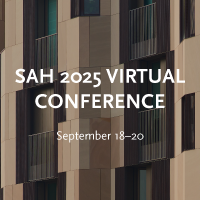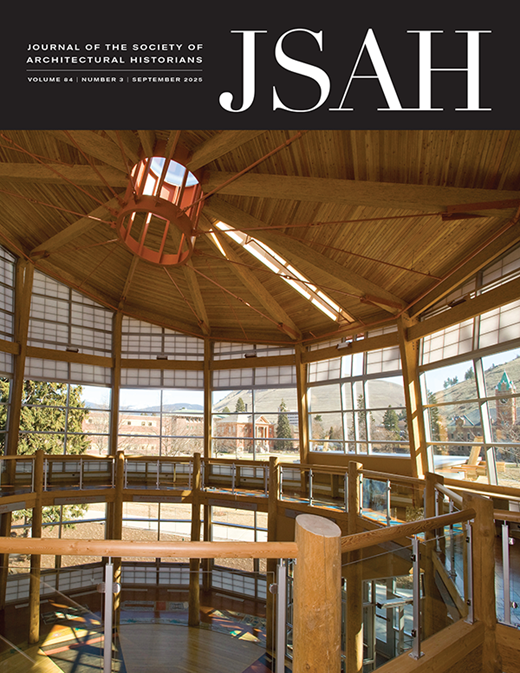The Society of Architectural Historians is pleased to announce the creation of two new Affiliate Groups: the SAH Climate Change and Architectural History Affiliate Group and the SAH Women in Architecture Affiliate Group. SAH Affiliate Groups are special interest bodies comprised of SAH members who share a common, narrowly defined interest, scholarly or otherwise. Members of SAH Affiliate Groups meet in person or remotely to pursue their common interest and may request space at the SAH Annual International Conference to hold a meeting or roundtable to discuss current issues that may be of interest to the larger SAH membership. SAH membership is required to join an Affiliate Group. To learn more about SAH Affiliate Groups and how to get involved, visit sah.org/about-sah/sah-affiliate-groups.
Read the proposals below to learn about the missions of the new SAH Affiliate Groups.
SAH Climate Change and Architectural History Affiliate Group:
This affiliate group will explore the impact of the climate crisis on the methods and narratives used to write architectural history, as well as the role architecture has played in shaping the current crisis. Architecture, as a professional practice, a cultural discourse, and an academic discipline, is deeply enmeshed in the production of carbon emissions and the mitigation of relevant effects. The persistence of technological positivism in the profession's treatment of architecture's entanglement opens a productive role for historians and critics. At the same time, both the concepts and technologies relevant to climate change have begun to inform frameworks for knowledge production in a range of adjacent fields, from anthropology to media studies. This affiliate group will aim to develop a strong and diverse cohort of junior and senior scholars within SAH, and also to reach out and participate in these emergent, vibrant, and vital discussions.
The climate crisis is intertwined with a broad range of social, political and cultural challenges relevant to the study of architectural history. The history of architecture has been an environmental history from its start, using resources and inhabiting locations that alter the environment around them. From depletion of the Cedars of Lebanon to cultures of development and preservation, resource use and attitudes to change through time are legible in architecture and architect's strategies—a situation that has only become more stark as resource use has intensified since World War II. Since this time, historians of architecture have begun to tell the story of those changes and to consider forms of architecture that are on the margins of many narratives of technological progress.
In addition to the consideration of the buildings as climate-mediating systems (that is, histories of climatic architecture), this affiliate group will also focus on climate justice—the ways in which inequities and instabilities produced by climate change are distributed, often with the heaviest impacts on the most vulnerable. In other words, studying climate in architecture allows for novel scholarly and public engagement with political and economic structures, enriching knowledge across scales. The affiliate group aims to serve as a forum for considering how architectural history can take into account this wide span of relevant issues, and for how scholarly methods can become increasingly attuned to this and other challenges in the social realm.
Applicants:
Dalal Musaed Alsayer, Kuwait University; Daniel A. Barber, University of Pennsylvania; Joy Knoblauch, University of Michigan
Charter Members:
Peter Christensen, University of Rochester; Isabelle Doucet, Chalmers University; Jennifer Ferng, University of Sydney; Emily Eliza Scott, University of Oregon; and Sara Stevens, University of British Columbia
SAH Women in Architecture Affiliate Group:
The mission of SAH Women in Architecture Affiliate Group is to provide a forum for collaborative scholarship and discussion, to document and advocate the international, national, and regional contributions of women to the built environment, and to advance and support research, publication, education, and exhibition initiatives on the subject, integrating professional standing of women in architecture with broader studies on leadership, identities, philosophies, and structures of power across borders and cultures.
Recognizing the broad scope of professional engagements and diversity of the ways women have shaped architecture and the built environment around the world, and that these chronologies have only begun to be written and disseminated, the group aims to build a sustainable professional community, support the breadth of interests of SAH members, and signify a platform for wide-ranging inquiry into methodological and pedagogical approaches to the projects around women in architecture and design. Our guidelines are envisioned to acknowledge the vast landscapes of yet latent legacies, contexts, and perspectives, to record the largely unwritten history of women in the discipline, to invite questions and debates, stimulate studies and discussions in emerging and bordering areas, and to address current work and the cultivation and empowerment of the next generation. The gravity of objectives for the group is determined by an urgency to fill the void in resources about women’s professional contribution to the built environment, leadership, activism, and new trajectories of global transitions. We will pursue and support a variety of activities in collaboration with SAH affiliate groups. Meetings at annual SAH conferences will focus on any number of concerns related to the history of women in architecture, design, and the built environment, and will provide opportunities for members to learn about new research in the field as well as prospects for funding and publication of their work.
Applicants:
Initiative: Anna P. Sokolina, International Archive of Women in Architecture
Leadership Group: Annmarie Adams, McGill University; Kathryn E. O'Rourke, Trinity University; Rebecca Siefert, Governors State University; Margaret Birney Vickery, University of Massachusetts; Nathaniel Robert Walker, College of Charleston; and Danielle S. Willkens, Georgia Institute of Technology.
Leadership Support Group: Ann Marie Borys, University of Washington; Wanda A. Bubriski, Beverly Willis Architecture Foundation; Sara Caples, Caples Jefferson Architects; Meredith L. Clausen, University of Washington; Catherine Boland Erkkila, SAH Archipedia; Alice T. Friedman, Wellesley College; Sarah W. Goldhagen, Cooper Union; Mary McLeod, Columbia University; Kevin D. Murphy, Vanderbilt University; Barbara Opar, Syracuse University; Alexander Ortenberg, California State Polytechnic University; Despina Stratigakos, University at Buffalo; Abigail Van Slyck, Connecticut College; Julia Walker, Binghamton University; Thaisa Way, University of Washington; and Catherine W. Zipf, Bristol Historical & Preservation Society.


